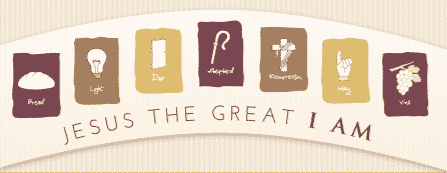In my previous post I spoke of how God uses a consistently beautiful pattern of storytelling through a process of Perfection, Rejection, and finally Redemption. In everything that we see, this sequence is very much present all around us, whether it be the natural course of creation, the happenings of our everyday lives, the events in God’s Word, or the entirety of His plan of existence. I also spoke of how He uses this plot-line in His stories consisting of such artistic beauty to both bring glory to Him & His holiness and give us a gracious manifestation of His goodness. In relation to all this I want to repeat something I said in that very post, “In everything God is always working to present and tell a story of Redemption!” I believe this wholeheartedly and with plenty of support behind it!
So why in the world did I just bring all of that back up?? For a very good and personally exciting reason actually! Because what I want to do now is just a quick run through of a few of the very stories that God has implemented His uniquely profound method of storytelling right into! I’m extremely pumped to do so as well because I truly enjoy spotting and experiencing all of the ways the Lord displays His gracious redeeming work! But, know that there is absolutely no way that I’m going to hit on every single one of the stories because the countless examples could really go on endlessly. That’s how important it is to God for Him to get this awe inspiring message out!
What I’m going to start off with is something that I really debated on whether to put at the beginning or the end because it really does belong at each/either side. And I could probably even do it at both of these positions. But I won’t do that (at least not entirely) in order to avoid needless repetition. It’s gonna be at the beginning though because I feel it’s an extremely important understanding to have as the backdrop behind the rest of the stories. But anyways, let’s go ahead and jump in with…
The Plan of Humanity: God created man in His image at the place, along with the rest of creation, of highest possible complete, absolute perfection. He truthfully intended it to forever be this way, but knew inevitably that with the loving aspect of free will that a fall would come. And just as would be expected, man fell, and is still in that very fallen state of sinful rejection of God. The effects of this fall were and still are quite literally death, disease, and separation. But that is in no way at all the end of the matter. Since that time God has perpetually provided a sacrifice to cover up and remove the fall and it’s harmful effects. And one day in the completion of the redemption of mankind and everything else, Christ, who is and always has been the perfect sacrifice, will return to deliver His people, the ones accepting of the redemption plan, and establish His final, restorative kingdom!
Now I hope you don’t get burnt out with the rest of the stories I’m about to present as I just opened with some super exciting truths! Don’t worry, we’ll get back to it though. Moving forward…
Adam & Eve: With them being the very first male and female members of the human race they were obviously present at the complete, initial perfection of all things, so there’s not much to say here but that they were literally flawless as life began. But they disobeyed the one commandment that God gave them, to not eat of the tree of the knowledge of good and evil, and through the temptation of the evil one they ate of the fruit and so fell upon rejection. But God provided a lamb of redemption for them to be a covering sacrifice and, though death would now come, they were still allowed to have ruling dominion over the creation.
Cain & Abel: In the new highest state of possible perfection these brothers, though having a sin nature and not living on the ideal earth, still had the ability to have a relationship with God, even speaking directly with Him. Both Cain and Abel had the opportunity to serve and sacrifice for the Lord, to the extent that they knew exactly how He would have them do it. Abel obeyed and did it the Lord’s way, but Cain disobeyed and did it his own way. To make matters worse, Cain fell into further rejection by becoming angry at the resulting dissatisfaction with his sacrifice and murdered Abel. Redemption ends up showing its face here in several ways- Abel was brought into a heavenly relationship with God. Cain, even though he was banished and relocated, was still allowed to live on the earth. Also, the birthright and line of David and Christ was continued through Adam and Eve’s next son, Seth.
The Flood: Perfection can be drawn from the fact that mankind was graciously left to live under their own free will with the potential of choosing to follow God. Mankind as a whole choosing to only do wickedly in all things was the rejection of God in this case. Redemption was then provided in the option to take refuge in the ark as the world faced destruction underneath the water. Then after it was all over, with a rainbow, God promised to never destroy the earth with water again.
Noah: The perfection found here is that Noah was the one who was still righteous in God’s eyes before the flood and was chosen to be the one to point people to the potential salvation in the ark, humans denying salvation is besides the point. After the voyage on the ark, Noah did go through rejection of God’s ways by losing control of himself and getting drunk. But God is gracious and forgiving, so even in this failure Noah was still allowed to repopulate the earth in an act of pure redemption.
Tower of Babel: There was perfection in the fact that, after Shem, Ham, and Japheth spread throughout the world, a relationship with God was very much accessible and attainable by all mankind, beyond that there was a worldwide language, rendering men extremely wise and successful in their endeavors. Rejection of God rose up as men became full of pride, thinking themselves greater than Him, working together to build a tower that reached to the Heavens. The humans were punished as God put forth confusion by causing there to be different languages and so scattering them among different people groups. But there was still redemption because men were still able to live on and find a relationship with Him under this new living condition.
Job: Perfection would easily be the description of the first half of Job’s life because in God’s eyes he was one of, if not the, most righteous men alive at the time (though he still would have sinned) and was one of the wealthiest alive as well. In this case, there was no blatant rejection of God by Job, but rejection does show up in two ways- It is felt by him in the losing of all his possessions, health, and family as the devil was given permission to test his faith. It also comes up in the sin of bitter complaining. Redemption of all his things to the extent of a double portion is what comes at the end of the testing of Job’s faith, which indeed holds firm by leaning on God.
Abraham: Early on in his life, Abraham (then Abram) experiences perfection in the direct relationship with God that the Lord gives to him, along with the promises of many blessings. Rejection rears its ugly head in the sins of foolish stupidity that Abraham commits- lying about his wife and committing adultery in an attempt to bring forth the promise of a son (which is to blame for much of the Middle East conflict). Grace continues to chase Abraham throughout his life despite this and redemption is seen in the continued relationship that includes the promise of a new land, a new nation, and a new blessing.
Isaac: Perfection? The fact that he was the blood heir to the blessings and God of Abraham. Rejection? Taking part in favoritism when it comes to his children. Yes, it’s a very strange way to fall. Redemption? God maintains all the blessings of Abraham to continue in his family.
Jacob: Perfection is, once again, simply the fact that Jacob was born into the family, and therefore blessings & God of Abraham and Isaac. There is rejection of all that is right seen in his deceptive thievery of the birthright of Esau amidst the volatile favoritism displayed by their parents. To this day there is still conflict between the descendants of the two. We find an interesting, mysterious decision of God here because he deployed redemption in a way that allowed the birthright to remain Jacob’s and continue the line of Abraham through him. Once again, grace makes a way for God’s people! Also worth noting, his name was changed to Israel, the eventual name of the Hebrew nation.
Joseph: Joseph’s life right from the beginning was truly perfection, as in so many ways God’s favor was abundantly evident over him. First of all he was the first son of his father’s preferred wife (Jacob was duped into marrying the wrong sister first, you’re going to have to look into that one yourself), so he was Jacob’s favorite son (yeah that sin runs in the family) and also God’s heir to the blessing for covenantal purposes. So much was his favor that he was given a beautiful, colorful coat to physically exemplify it. He even had magnificent dreams that told of the success that would come of him through the favor of God. But Joseph became unintentionally prideful in relation to these things, coming to a place of rejection to God’s humble ways. To make matters worse, his brothers had come to hate him and nearly murdered him, opting instead to simply sell him into slavery to Egypt. God’s gracious favor remained with him though and he rose up in rank among the slaves, only to eventually be falsely accused and thrown in prison, where he rose in rank among the prisoners. Redemption clearly showed itself over and over again in Joseph’s life and in the end he was made second in command over Egypt, being given the opportunity to free his undeserving family from economic depravity and instead live and prosper in Egypt.
Moses: There was orchestrated perfection from the time of Moses’ birth when Pharaoh aimed to kill every Hebrew baby, but he was saved and then brought up in the Egyptian kingdom by Pharaoh’s daughter. One day, in an attempt at bringing justice, he killed an Egyptian man after seeing him mistreat a Hebrew slave, thus committing rejection against God. Yes, he appears to do it with just cause in our eyes, but it is never right to take matters into your own hands and bring judgment that isn’t yours to give in the first place. After faltering in this way, Moses fled Egypt to live in the wilderness. God then sought him out in the form of a burning bush in the wilderness, offering him redemption in the role of delivering the Hebrew people out of slavery in Egypt. God provided the way for this to be done and he was able to lead his people out and prepare them for the promised land.
Wandering Israelites: The Israelites being delivered from slavery in Egypt and brought back to a place of being the nation of God, that’s perfection. The Israelites murmuring, complaining, and sinning in so many other ways despite their deliverance, promise to eventually reside in the land of Canaan, and countless other blessings, that’s rejection toward God. God still enables the Israelites to enter the promised land, with the next generation, under the leadership of Joshua and Caleb, that’s redemption.
The Judges: Perfection showed itself as the Israelites came into possession of the promised land and were provided judges to lead the people through God. There was repetitive rejection towards God in this time period as the people turned away from Him even though they had leaders dealing directly with Him. Redemption remained as the Lord simply kept providing a relationship with Him through more judges.
Saul: After the judges, Saul’s perfection was that he was chosen to be the first king of the ruling Kingdom of Israel. Rejection of God’s ways had a pattern of showing up in his usual course of actions… He did not want to be the king in the first place, became arrogant in the way he ruled, and directly disobeyed the Lord’s commands, which cost him the kingdom. Redemption is hard to find when you look at Saul, but it really is there… He lost the kingdom and he and his sons died in battle, but they still were His people and maintained a relationship, though his was damaged, with God.
David: In perfection he was chosen by God to be the successor to the throne, following Saul, and grew up being groomed in the kingdom. God gave him many victories, some over beasts while shepherding and others over men in battle. He was also gifted with the ability to write psalms. David faced rejection as he fled from a jealous Saul, committed adultery with Bathsheba, and had turmoil run rampant in his dysfunctional family. Redemption simply followed him all the days of his life because even with his severe missteps he was still graciously considered by God to be a man after His own heart and is still known as the great King of Israel. Eventually Jesus came from his bloodline. His story and his songs are still observed and learned from at a high volume even now.
Solomon: At a place of perfection, Solomon was the successor of the throne of David during a time of major peace and growth. In his relationship with God he asked for wisdom and prosperity and received it from Him abundantly. So much was this prayer answered that, along with rebuilding the Temple, he obtained the knowledge to write Proverbs and Song of Solomon. Out of a slow rejection in his heart, he turned away from the wisdom that was given to him and chased after fleshly desires instead of the ways of God for the longest time. Redemption came as Solomon realized his foolishness, repenting and writing the book of Ecclesiastes. God forgave and restored wisdom as his reign closed out, and to this day we can still glean wisdom from all that he wrote.
The Kings: Over a long period of the successive thrones of the kings of Israel God employed His storytelling like this… In perfection Israel had good kings, who, by the way they ruled the kingdom right, brought prosperity to the land. In rejection Israel had bad kings, who, by the way they ruled wickedly, brought destruction to the land. In redemption God continued to be with Israel and allowed the kingdom to stand in this cycle of good and bad kings.
Israel’s captivity & release: The perfection in this case is the fact that the kingdom simply continued to exist by the power of God amid Israel’s flip-flopping morality. Eventually Israel’s rejection became insurmountably horrible though. They just couldn’t get it together and so as the Babylonian empire spread its reach further and further, the Israelites were conquered and brought into captivity. Out of redemption, the Persian Empire came to power and God provided King Cyrus to restore the Israelites back to their land with the leading of Ezra and Nehemiah.
The Disciples: As the highest form of relational perfection in their time, each of them were of the children of Israel and so had some level of fellowship with the living God. Each of them went through rejection in their own way though, sinning against God and missing His mark. But redemption came along in Jesus, and the Son of God accepted and directed them just as they were, flaws and all.
Jesus’ Followers during crucifixion & resurrection: Everything was the picture of perfection as they’ve been living among and around the Son of God, taking part in His earthly ministry. The crucifixion then took place, catching the followers off guard because they had never expected this to happen. They then experience an unintentional rejection of God’s ways by becoming depressed and downtrodden by their apparent defeat, all the while missing what Jesus had been telling them. After the resurrection, which obviously has plenty of more restoration to it, redemption is provided as the Lord does not abandon them in their lack of faith, but continues the relationship and enables them to further His kingdom with the filling of the Holy Spirit.
Paul: In what can be seen as beginning perfection Saul, his original name, being of the tribe of Benjamin is exposed to and in a way experiences a relationship with the one true God. But he goes through a rejection of the truth by becoming self-righteous in his religion, not believing Jesus to be the Messiah, and killing many members of early Christianity. One day, Christ appeared to him on the road to Damascus opening his eyes to where he’s been wrong. In this moment he turned his life completely upside down and around and in redemption God made him one of the most well-known followers of Christ to ever live.
(Note: I didn’t directly go through providing references for all of these Biblical occurrences, but I assure you they are in there and everything I have said about them is consistent with God’s Word. If you don’t really trust or believe me or even just want to, I absolutely encourage you to go get it directly from the Bible.)
Now, how about some examples in nature?
The Seasons: In the summer the trees, and everything else, are at their peak of beauty and splendor, so by all means nature is at a place of perfection. When the fall comes, well just that happens, everything begins to fall, and so begins its rejection of all things seemingly perfect. As winter arrives nature transforms into what is a barren wasteland, the death that ensues after the fall. But spring provides the necessary redemption that leads back to summer, in the bloom that restores it all to its original completeness.
Life Cycles: The water cycle, the photosynthetic cycle, the cycle of energy consumption, rock cycle, celestial movements, and I could obviously go on and on. Perhaps I can’t exactly pinpoint the direct moments of perfection and respective rejection in these particular cases, but the nature of anything cyclic is, truthfully, one that is constantly consisting of redemption as whatever progression the cycle is at, through the process, it will eventually end right back up at the initial stage.
Let’s get a little personal now and put together how it can apply to our lives..
Us: We are born in the highest possible state of perfection when we come into this life, which for us means though we have the inherent sin nature that is a result of the initial fall of mankind, we come with the innocence of not recognizing the flaw in our ways and not understanding the way of escape provided for us in Jesus, so as long as we are at an immature mental/spiritual age and don’t have that understanding our relationship with God is not one of utter separation. But as we get older we make decisions and mistakes that clearly aren’t consistent with what is right and so take part in a rejection of what God plans for us. In doing this we experience hurts, heartaches, hurdles, and hold-backs that are all results of missing the mark, but are meant to point us back to God and a relationship with him. These trials teach us of the truth and the lies of life, draw us near to what’s right, and make us thirsty for the grace of the gospel! And when our spiritual eyes are opened and we see the truth God is revealing that He sent his only son, Jesus, as the restorative provision to the fall, we can choose to accept or deny the gift that He is and offers. To accept means to enter into the redemption of Christ, to come into intimate fellowship with the God of it all! And after that, we get the joy of seeing it done again and again!
So there you have it, the great stories of The Great Storyteller are imagined, woven, and put in motion to tell of and prepare us for His plan of redemption and restoration! We started in complete Perfection to reign and live forever with God, then fell into a dangerous place of sinful Rejection of that life, but in Jesus there is Redemption, the ability to go back to the beginning again!



